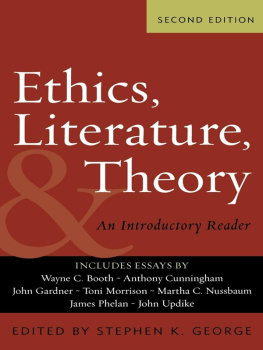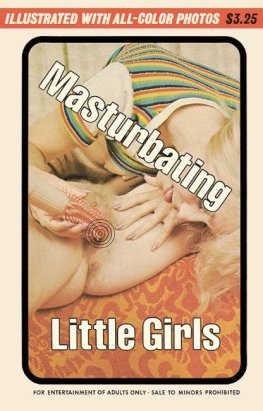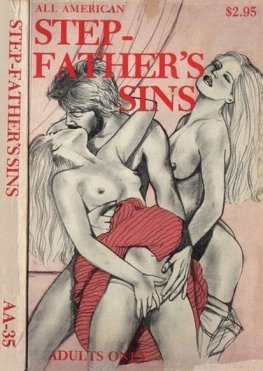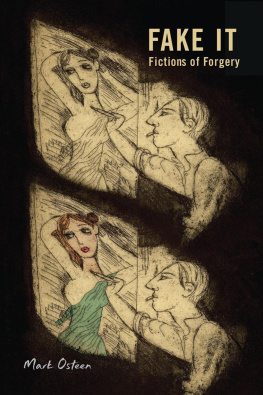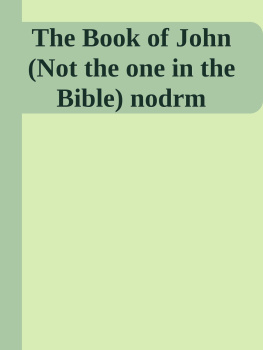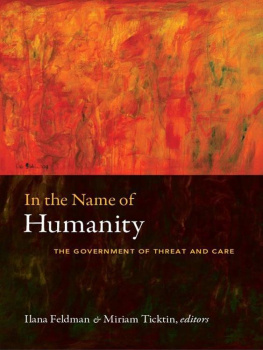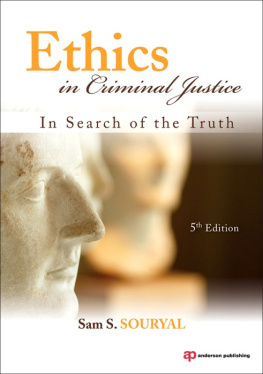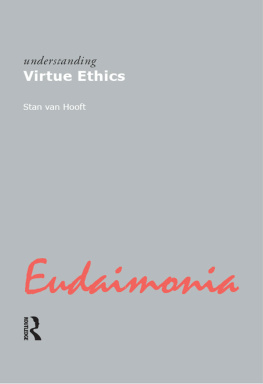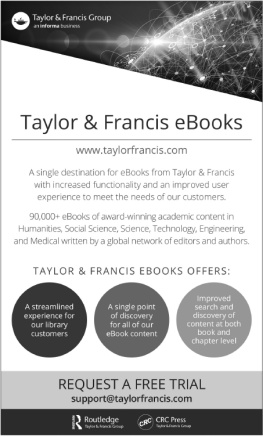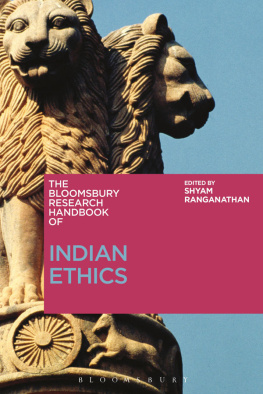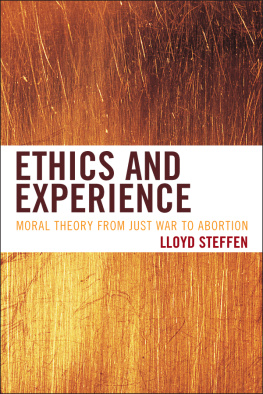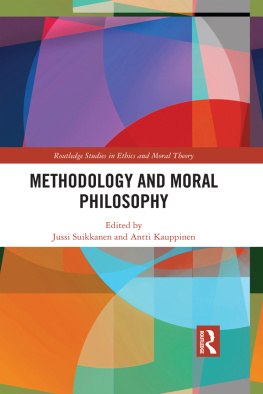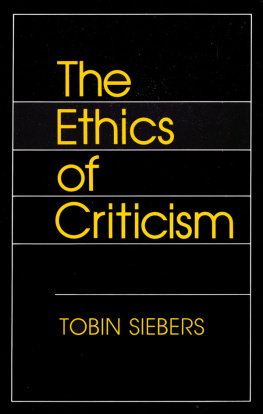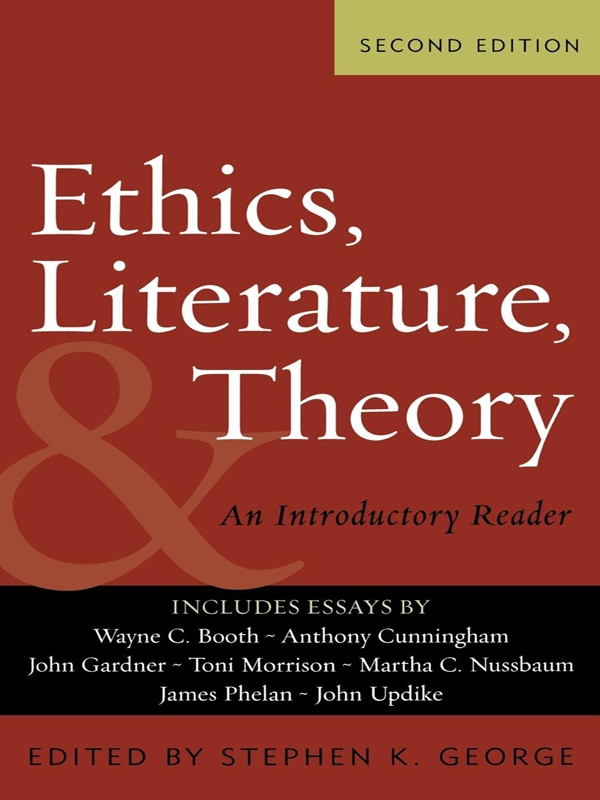The creation of Ethics, Literature, & Theory owes a measure of debt to many, many people, most of all to the contributors of new chapters who enthusiastically met deadlines while producing some of the finest thoughts on ethics, literature, and theory ever offered. I am also grateful for the many students in Brigham Young UniversityIdahos ENG 495 course who over the past two years provided a receptive and critical audience for the first edition. Their excitement over the ideas and issues convinced me that this book was needed.
I am particularly indebted to Wayne Booth, the leading figure of contemporary ethical criticism, for endorsing this project and for graciously agreeing to write the texts foreword. I also owe much to Jeremy Langford of Rowman & Littlefield for his immediate interest in this unique collection and to Katie Lane for her editorial and production guidance. My sincere thanks to colleagues Robert Bird and Anne Papworth, who helped with the proof draft. And as always, my wife Rebecca was my best audience.
This book would not exist, however, without the vision of the first editions coeditor, Kip Hartvigsen, who has been untiringly supportive of this effort to encourage a serious discussion of ethics within the discipline of English. Kip, this is for you.
About the Contributors
Dudley Barlow is a high school English teacher from Plymouth, Michigan. He wrote his essay defending the teaching of Adventures of Huckleberry Finn in 1992 for Education Digest.
Wayne C. Booth is regarded by many as the father of the resurgent interest in ethical criticism in the second half of the twentieth century. A professor emeritus of English at the University of Chicago and former president of the Modern Language Association, his books include The Company We Keep: An Ethics of Fiction, The Vocation of a Teacher, and a forthcoming work on the rhetoric of religious discourse.
Orson Scott Card is one of todays preeminent science fiction writers. Most famous for Enders Game, which won both the Hugo and Nebular Awards for best novel in 1986, Mr. Cards most innovative work may be the American fantasy series The Tales of Alvin Maker.
Anthony Cunningham is professor of philosophy at St. Johns University and author of The Heart of What Matters: The Role for Literature in Moral Philosophy.
John Gardner can rightly be said to have set the torch to the contemporary debate on morality and art with his passionate 1978 manifesto On Moral Fiction. Besides his acclaim as a novelist for The Wreckage of Agathon, Grendel, The Sunlight Dialogues, and October Light, Gardner was also a musician, painter, playwright, and teacher of creative writing, mentoring award-winning authors Raymond Carver and Charles Johnson.
Stephen K. George teaches literature, writing, and philosophy at Brigham Young University-Idaho. He has published in venues such as The Oxford Encyclopedia of American Literature, African American Review, and The Steinbeck Review. He has also edited or coedited four books, including John Steinbeck: A Centennial Tribute and The Moral Philosophy of John Steinbeck.
Marshall Gregory is Harry Ice Professor of English, Liberal Education, and Pedagogy at Butler University. He is coauthor of Traveling in the Realms of Gold: Teaching Literature in the Undergraduate Classroom and has published in such journals as Narrative, Modern Literaty Studies, CEA Critic, and the Journal of College Teaching.
John J. Han is professor of English at Missouri Baptist University and founding editor of Intgrit: A Faith and Learning Journal. He has scholarly publications on Flannery OConnor, Andrew Marvell, and John Steinbeck, as well as on Christian issues within higher education.
Jack Harrell teaches literature and creative writing at Brigham Young University-Idaho and is the former director of Outlet Literary Journal. His work Vernal Promises received the 2000 Marityn Brown Award for best novel from the Association for Mormon Letters.
Richard E. Hart is Cyrus H. Holly Professor of Applied Ethics at Bloomfield College. He has written and lectured extensively on literature and philosophy and is the editor or coeditor of Ethics and the Environment , Platos Dialogues: The Dialogical Approach, and Philosophy in Experience: American Philosophy in Transition.
Barbara A. Heavilin is associate professor of English at Taylor University in Upland, Indiana. She is the former editor of the Steinbeck Yearbook; coeditor of the academic journal, The Steinbeck Review ; and coauthor of The Quaker Presence in America .
Marianne Jennings is professor of legal and ethical studies at Arizona State University. Her books include Case Studies in Business Ethics and Business: Its Legal, Ethical, and Global Environment . Jenningss work has also appeared in such popular venues as the Wall Street Journal, New York Times , and Readers Digest, and she has served as a guest commentator on the CBS Evening News, CBS This Morning, CNBC, and the Today Show.
Charles Johnson is an endowed professor of English at the University of Washington and author of Middle Passage , which received the 1990 National Book Award for Fiction. The first African-American man to receive this award since Ralph Ellison in 1953, Johnsona Ph.D. in philosophywas named in a University of Southern California survey as one of the ten best short story writers in America.
Bernard Malamud is best known for his sympathetic portrayals of spiritually bewildered Jews in such stories as The Mourners, The Magic Barrel, and Angel Levine. His first novel, The Natural, was eventually made into a popular movie starring Robert Redford, while his most highly regarded work, The Fixer, received both the Pulitzer Prize and a National Book Award.
Toni Morrison, the first African-American recipient of the Nobel Prize for literature, is considered one of the most highly acclaimed writers in the world today. Her best-known works include the trilogy Beloved, Jazz, and Paradise, with the first novel receiving the Pulitzer Prize for fiction in 1988.
Georgia A. Newman, former president of the Two-Year College Association (TYCA) and active participant in the National Council of Teachers of English (NCTE), taught literature and writing at Polk Community College for over thirty years. Formerly an associate professor of English at her alma mater, Georgia College & State University, Dr. Newman is currently completing a book about the literary friendship of her favorite author, Flannery OConnor, and the playwright Maryat Lee.
Martha C. Nussbaum is Ernst Freund Distinguished Service Professor of Law and Ethics at the University of Chicago. She received her B.A. from New York University and her M.A. and Ph.D. from Harvard University. Recipient of the Brandies Creative Arts and the PEN Speilvogel-Diamondstein writing awards, her major publications include The Fragility of Goodness: Luck and Ethics in Greek Tragedy and Philosophy and Loves Knowledge: Essays on Philosophy and Literature.
Joyce Carol Oates is probably best known for the immense scope of her work, which ranges from traditional realistic fiction to fantasy, horror, mystery, and gothic romance. Recipient of numerous literary honors, including a National Book Award for her early novel them, Professor Oates currently teaches creative writing at Princeton University.
Flannery OConnor is widely regarded as one of American literatures finest short story writers. Her anthologies include A Good Man Is Hard to Find and Everything That Rises Must Converge, while her posthumously published Complete Stories received the 1971 National Book Award for Fiction. She also wrote two novels, Wise Blood and The Violent Bear It Away.

